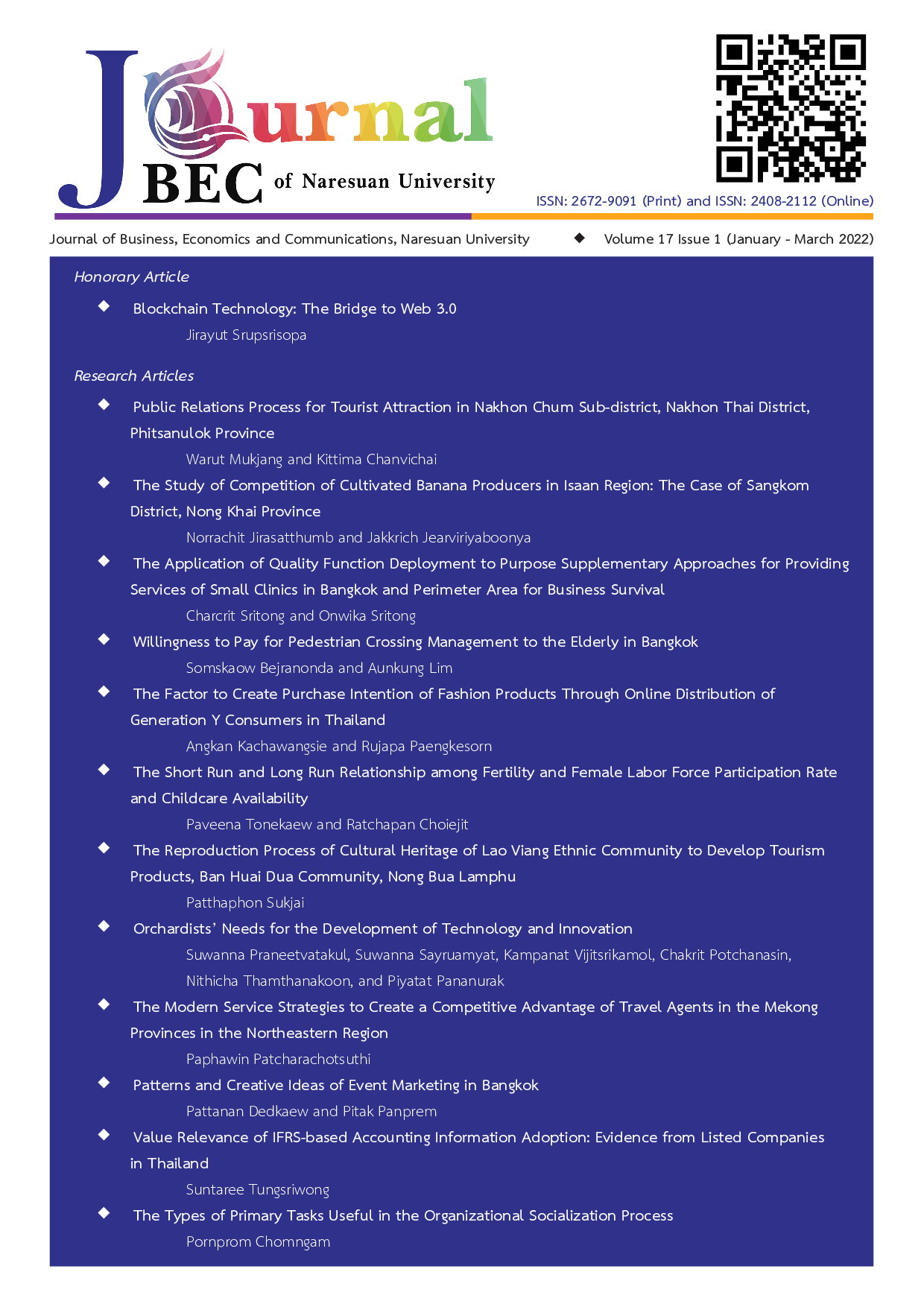Value relevance of IFRS-based accounting information adoption in Thailand Listed Company
Main Article Content
บทคัดย่อ
This research’s objective is to study the value relevance on accounting information under the international financial accounting standard issued during 2009 – 2019. Ohlson’s regression analysis model (1955) was used in the study. The results showed statistically significant positive correlations between the accounting information, including book value and earnings, and the security price. The 2009 – 2019 study results revealed that the book value’s relevance decreased, in contrast to that of the earnings. Additional study without the outlier 2019’s pandemic data found that the book value’s relevance was unchanged, while the earnings information was found to increase in its value relevance. The results also showed that accounting information under the new international financial reporting standard had value relevance to decisions. This observation agreed with the main qualitative property of the conceptual framework for financial Reporting. The result also showed changes in accounting information which will result in education on the accounting information to investors, and further improvements of the financial report standards in the future.
Article Details

อนุญาตภายใต้เงื่อนไข Creative Commons Attribution-NonCommercial-NoDerivatives 4.0 International License.
เอกสารอ้างอิง
Balachandran, S., and Mohanram, P. (2011). Is the decline in value relevance of accounting driven by increased conservatism? Review of Accounting Studies, 16, 272-301.
Ball, R., and Brown, P. (1968). An empirical evaluation of accounting income numbers. Journal of Accounting Research, 6(Autumn), 159-178.
Beaver, W. (1968). The information content of annual earnings announcements. Journal of Accounting Research, 6(Supplement), 67–92.
Beaver, W.H. (2002). Perspectives on recent capital market research. The Accounting Review, 77(2), 453-474.
Beaver, W. H., McNichols, M. F. and Wang Z. Z. (2019). Increased market response to
earnings announcements in the 21st century: An Empirical Investigation. Journal of Accounting and Economics, https://doi.org/10.1016/j.jacceco.2019.101244
Brown, S., Lo, K. and Lys. T. (1999). Use of R2 in accounting research: Measuring changes in value relevance over the last four decades. Journal of Accounting and Economics, 28, 83-115.
Chalmers, K., Clinch, G. and Godfrey, J. M. (2011). Changes in value relevance of accounting information upon IFRS adoption: Evidence from Australia. Australian Journal of Management, 36(2), 151–173.
Collins, D.W., Maydew, E.L. and Weiss I.S. (1997). Changes in the value-relevance of earnings and book values over the past forty years. Journal of Accounting and Economics, 24, 39-67.
Elshandidy, T. (2014). Value relevance of accounting information: Evidence from an emerging market. Advances in Accounting, 30(1), 176–186.
Francis, J. and Schipper, K. (1999). Have Financial Statements Lost Their Relevance? Journal of Accounting Research, 37(2), 319–352.
Francis, J., Schipper, K. and Vincent, L. (2002). Expanded disclosures and the increased usefulness of earnings announcements. The Accounting Review, 77(3), 515–546.
Gu, Z. (2007). Across-sample incomparability of R2s and additional evidence of value relevance changes over time. Journal of Business, Finance, and Accounting, 34(7), 1073-1098.
Hail, L., Leuz, C. and Wysocki, P. (2010). Global accounting convergence and the potential adoption of IFRS by the U.S. (Part I): conceptual underpinings and economic analysis. Accounting Horizon, 24(3), 355-394.
Holthausen, R.W. and Watts, R.L. (2001). The relevance of the value-relevance literature for financial accounting standard setting. Journal of Accounting and Economics, 31, 3–75.
Ohlson, J. A. (1995). Earnings, book values, and dividends in equity valuation. Contemporary Accounting Research, 35, 83-96.
Lam, K.C.K., Sami, H. and Zhou, H. (2013). Changes in the value relevance of accounting information over time: evidence from the emerging market of China. Journal of Contemporary Accounting & Economics, 9(2), 123-135.
Landsman, W. and Maydew, E. (2002). Has the information content of quarterly earnings announcements declined in the past three decades? Journal of Accounting Research, 40, 797–808.
Lev, B. and Zarowin, P. (1999). The boundaries of financial reporting and how to extend them. Journal of Accounting Research, 37(2), 353-385.
Vichitsarawong, T. (2011). The value relevance of earnings and cash flows: Evidence from Thailand. Journal of Accounting Profession, 7(19), 39–53.
Yao, D., Percy, M., Stewart, J. and Hu, F. (2018). Fair value accounting and earnings persistence: Evidence from international banks. Journal of International Accounting Research, 17 (1), 47–68.
Srijunpetch, S. (2006). The implementation of international accounting standards in Thailand. Journal of Accounting Profession, 2(5), P 64–84.
Srijunpetch, S. (2016). Auditor and Fair value Auditing. Journal of Business Administrator, 5(2), 9-15.
Phakdee, A. and Srijunpetch, S. (2020). The value relevance of accounting information in financial industry: 15-year perspective. Journal of Business Administrator, 9(1), 196-214.
Emerson, D. J., Karim, K. E. and Rutledge, R. W. (2010). Fair value accounting: A historical review of the most controversial accounting issue in decades. Journal of Business & Economics Research, 8(4), 77-86.
Habib, A. (2008). The role of accruals and cash flows in explaining security returns: Evidence from New Zealand. Journal of International Accounting, Auditing and Taxation, 17, 51–66.
Mirza, A., Malek, M. and Hamid, M. (2018). Value relevance of earnings and book value of equity: Evidence from Malaysia. Global Business Management Review, 10 (2), 19-40.
Rusdiyanto, R. and Narsa, I. M. (2019). The effects of earnings volatility, net income and comprehensive income on stock prices on banking companies on the Indonesia stock exchange. International Review of Management and Marketing, 9(6), 18-24.
Federation of Accounting Professions of Thailand. 2021. https://www.tfac.or.th/Article/Detail/66976


